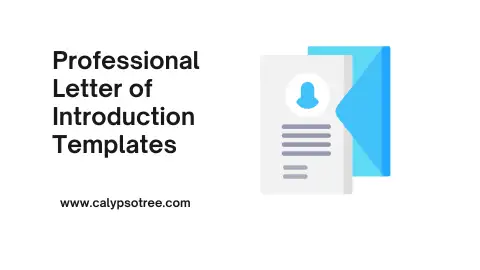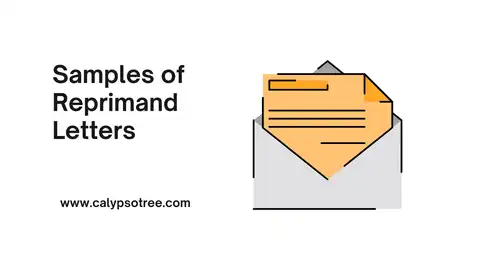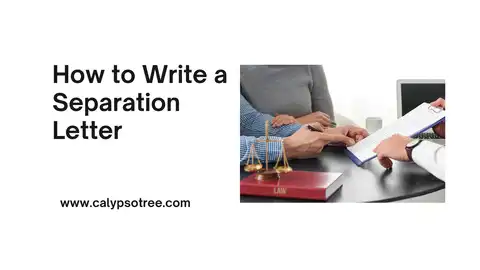Humanitarian parole letter sample – A humanitarian parole letter is a very special and important letter. It helps people in big trouble to come or stay in a country for a while. It might be because they are very sick or in danger.
Families write this letter to help their loved ones. Friends, lawyers, doctors, and community leaders can write it too.
In this guide, we’ll learn what needs to be in the letter and how to write it correctly. We’ll also look at common mistakes and how to avoid them. Here’s what you need to know to write a helpful humanitarian parole letter.
What information must be included in the letter?
Basic Information
Here is the basic information that must be included in the humanitarian parole letter:
- Your Name and Address: Always include your full name and address at the top of the letter.
- Recipient’s Address: Write the address of the immigration office handling the case.
- Date: Make sure to add the current date.
Introduction
Begin your humanitarian parole letter by explaining the reason for writing and stating your relationship to the individual who needs humanitarian parole.
Sample Introduction:
Dear Sir/Madam,
My name is John Doe, and I’m writing to request humanitarian parole for my sister, Jane Doe, who is facing a severe medical crisis.
Body of the Letter
Here, you’ll describe the urgent situation in detail.
- Explanation of the Emergency Situation: Use clear and simple language to explain the situation.
- Supporting Evidence: List any documents, like medical records, to support your claim.
Sample Body:
Jane is diagnosed with a life-threatening condition and requires immediate medical attention. Enclosed, you’ll find the medical reports and doctor’s recommendations.
- Request for Humanitarian Parole: Clearly state your request.
Conclusion
End the humanitarian parole letter with a polite closing and your contact information.
Sample Conclusion:
Thank you for considering this urgent request. Don’t hesitate to contact me at (123) 456-7890 for further information.
Sincerely,
John Doe
Enclosures
List the documents that are enclosed with the letter.
Sample Enclosures:
- Medical Reports
- Doctor’s Recommendations
- Proof of Relationship
Tips for writing a humanitarian parole letter
A humanitarian parole letter asks for special permission for someone to enter or stay in a country for an emergency. Writing it right is very important. Here’s how to do it:
Be Clear and Simple:
- How to Do It: Use easy words and short sentences. Explain what you need and why.
- Why It’s Important: Simple words make sure everyone can understand you.
Explain the Emergency:
- How to Do It: Say what the emergency is. Is someone sick? Is there a large issue?
- Why It’s Important: People must know why this is an emergency.
Show Proof:
- How to Do It: Add doctor’s notes or other papers showing the emergency is real.
- Why It’s Important: Proof helps people believe your story.
Be Polite and Kind:
- How to Do It: Use words like “please” and “thank you.”
- Why It’s Important: Being nice helps people want to help you.
Write Neatly:
- How to Do It: If you write by hand, ensure your humanitarian parole letter are easily read. Or you can type it on a computer.
- Why It’s Important: Neat writing ensures people can read your letter.
Check Your Spelling:
- How to Do It: Ask someone to help you read the letter and check for mistakes.
- Why It’s Important: Mistakes can make it hard to understand what you need.
Say Who You Are:
- How to Do It: Tell them your name and how you know the person you’re writing about.
- Why It’s Important: People like to know who is asking for help.
Add Contact Information:
- How to Do It: Put your phone number or email in the letter.
- Why It’s Important: They might need to ask you more questions.
Say What You Need Clearly:
- How to Do It: Say what you want. Do you want someone to come to your country? Or stay longer?
- Why It’s Important: Saying what you need helps people know how to help you.
Give the Letter to the Right Person:
- How to Do It: Find out who needs to read your letter and give it to them.
- Why It’s Important: The right person can ensure your letter is seen.
Writing a humanitarian parole letter is very serious. These tips help you write it the best way.
Who can write a Humanitarian Parole Letter?
A humanitarian parole letter requests temporary permission to enter or remain in a country due to an urgent situation. Convincing reasons and evidence must support this request. Here’s who can write this type of letter:
Family Members:
- Who They Are: Close relatives like parents, siblings, spouses, or children.
- Why They Can Write: They might know the situation best and can explain why the person needs help.
Friends and Acquaintances:
- Who They Are: People who know the person well but are unrelated.
- Why They Can Write: They can provide a different perspective and support the person’s need for parole.
Legal Representatives:
- Who They Are: Lawyers or legal guardians.
- Why They Can Write: They understand the laws and can write the humanitarian parole letter in a way that follows the rules.
Medical Professionals:
- Who They Are: Doctors, nurses, or other healthcare workers.
- Why They Can Write: If it’s a medical emergency, they can explain the condition and why the person needs help immediately.
Community or Religious Leaders:
- Who They Are: Leaders in the community or church, mosque, temple, etc.
- Why They Can Write: They often know the person well and can explain why the community supports the request.
Employers or Co-workers:
- Who They Are: People the person works with or for.
- Why They Can Write: They can explain how the person’s situation affects their work and why they need help.
Humanitarian Organizations:
- Who They Are: Groups that help people in need.
- Why They Can Write: They know how to write these letters and can explain why the situation is urgent.
The Person in Need:
- Who They Are: The person who needs humanitarian parole.
- Why They Can Write: They know their situation best and can explain why they need help.
Many people can write a humanitarian parole letter. It’s about more than who writes it and how well they can explain the need.
Talk to a lawyer or someone who knows about these letters to ensure it is accomplished correctly.
The Benefits
Here’s a detailed look at those benefits:
Helps People Fast:
- What It Means: If someone needs help fast, the letter lets them come or stay in a country.
- Why It’s Good: It helps with doctor needs, family problems, or other big needs.
Keeps People Safe:
- What It Means: If people are in danger, the letter can keep them safe.
- Why It’s Good: It keeps people safe who need help.
Brings Families Together:
- What It Means: Families that live far away can be together.
- Why It’s Good: It makes families happy.
Is Kind to People:
- What It Means: Being nice and kind to people is important.
- Why It’s Good: It makes everyone feel good.
Helps with Doctor Care:
- What It Means: People who need a doctor can get help.
- Why It’s Good: It helps people feel better.
Follows the Rules:
- What It Means: The letter follows the rules.
- Why It’s Good: It is the right way to ask for help.
Makes People Care More:
- What It Means: It makes people care for each other.
- Why It’s Good: It makes the world nicer.
Helps Countries Be Friends:
- What It Means: Countries help each other.
- Why It’s Good: It makes countries nice to each other.
Helps for a Little While:
- What It Means: The help is for a little while.
- Why It’s Good: It gives help now, and they find more help later.
These short and simple points explain the benefits in a way that’s easy for young readers to understand.
Common Mistakes
Here’s a look at some common mistakes and how to avoid them:
Lack of Clarity:
- What It Means: Writing in a way that could be clearer to understand.
- How to Avoid: Use simple words and short sentences. Explain what you need and why.
Missing Evidence:
- What It Means: Not including important documents or proof that support the request.
- How to Avoid: Gather and reference all necessary documents in the letter. Provide copies if required.
Being Overly Emotional:
- What It Means: Writing with too much emotion and needing more facts.
- How to Avoid: While emotions are important, focus on clear facts and logical reasons for the request.
Not Following Proper Format:
- What It Means: Write the letter without using the correct structure or format.
- How to Avoid: Look up guidelines or seek professional help to ensure the letter is formatted correctly.
Misspellings and Grammar Mistakes:
- What It Means: Errors in spelling or grammar make the letter look unprofessional.
- How to Avoid: Proofread the letter carefully or ask someone else to check it.
Lack of Politeness:
- What It Means: Using language that may seem rude or demanding.
- How to Avoid: Be polite and respectful in your writing.
Writing to the Wrong Authority:
- What It Means: Sending the letter to someone who needs help with the request.
- How to Avoid: Research who the letter should be addressed to and ensure it reaches the correct person or department.
Overly Long or Complicated:
- What It Means: Writing a letter that is too long or hard to read.
- How to Avoid: Keep the letter concise and to the point. Use clear language.
Failure to Explain the Urgency:
- What It Means: You must clearly explain why the request is urgent.
- How to Avoid: Clearly outline the urgent need and why immediate action is required.
Not Including Contact Information:
- What It Means: Omitting essential contact details for follow-up.
- How to Avoid: Always include your full contact information, phone number, and email address.
Avoiding these common mistakes will increase the chances of the request being understood and granted.
What documents should be enclosed with the letter?
Here’s a list of common documents that should be included:
Proof of Identity:
- What It Includes: Copies of passports, birth certificates, or other legal identification.
- Why It’s Needed: To confirm the identity of the person requesting parole.
Medical Documents (if applicable):
- What It Includes: Medical reports, hospital bills, doctor’s statements.
- Why It’s Needed: To provide evidence of a medical condition or emergency.
Legal Documents:
- What It Includes: Any legal paperwork related to the person’s situation, such as court orders, refugee status, or previous immigration records.
- Why It’s Needed: To show legal standing or particular legal needs.
Financial Documents:
- What It Includes: Bank statements, pay stubs, or evidence of financial support.
- Why It’s Needed: To prove financial stability or the need for financial help.
Letters of Support:
- What It Includes: Letters from family, friends, community leaders, or others who support the request.
- Why It’s Needed: Show that others support and verify the request.
Employment Documents (if applicable):
- Includes: Employment contracts, employer letters, or other proof of work.
- Why It’s Needed: To show employment status or work-related reasons for the request.
Evidence of Relationship (if applicable):
- What It Includes: Marriage certificates, family photographs, or other proofs of relationship.
- Why It’s Needed: If the request is related to family, these documents prove the relationship.
Educational Documents (if applicable):
- What It Includes: School records, transcripts, or letters from educational institutions.
- Why It’s Needed: If the request is related to education, these documents prove enrollment or educational needs.
Documentation of Urgent Humanitarian Needs:
- What It Includes: Evidence that shows why the request is urgent, such as news reports, photographs, or personal statements.
- Why It’s Needed: To make clear why immediate action is required.
Contact Information:
- What It Includes: Full name, address, phone number, and email address.
- Why It’s Needed: To allow for follow-up communication regarding the request.
Providing complete and accurate documentation will strengthen the request and facilitate the process.
Humanitarian Parole Process
Here are the general steps involved:
Determine Eligibility:
- What It Means: Understanding if the person qualifies for humanitarian parole based on urgent need or significant public benefit.
- How to Proceed: Review the requirements and consult a legal expert.
Prepare the Application:
- What It Means: Gather the necessary documents, including the humanitarian parole letter and supporting evidence.
- How to Proceed: Fill out the required forms and attach all relevant documents.
Pay the Required Fees (if applicable):
- What It Means: Some jurisdictions may require a fee for application processing.
- How to Proceed: Check the fee structure and pay as directed.
Submit the Application:
- What It Means: Send the application to the correct authority or agency responsible for handling humanitarian parole requests.
- How to Proceed: Follow the instructions for submission, which may include mailing, faxing, or online submission.
Await a Decision:
- What It Means: The relevant authority will review the application and make a decision.
- How to Proceed: Be patient and prepared to respond to requests for additional information.
Respond to Requests for Additional Information (if needed):
- What It Means: The reviewing authority may need more information or clarification.
- How to Proceed: Provide the requested information promptly and accurately.
Receive the Decision:
- What It Means: A decision will be made either granting or denying the request.
- How to Proceed: If approved, follow the instructions for the next steps. If rejected, consult with a legal expert about possible options.
Comply with Any Conditions:
- What It Means: There may be specific conditions attached to the grant of humanitarian parole.
- How to Proceed: Understand and comply with all requirements, including reporting needs or activity restrictions.
Following the correct procedure, providing complete and accurate information, and understanding the requirements and conditions can lead to a successful application.
Humanitarian parole letter sample
Here, we are providing a humanitarian parole letter sample. It is meant to be a general example and may need to be customized according to the specific requirements and guidelines of the relevant authority.
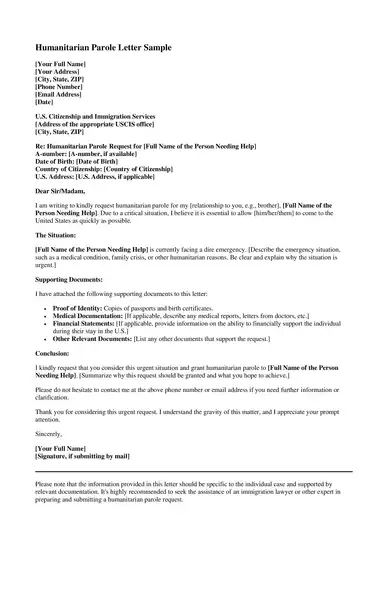
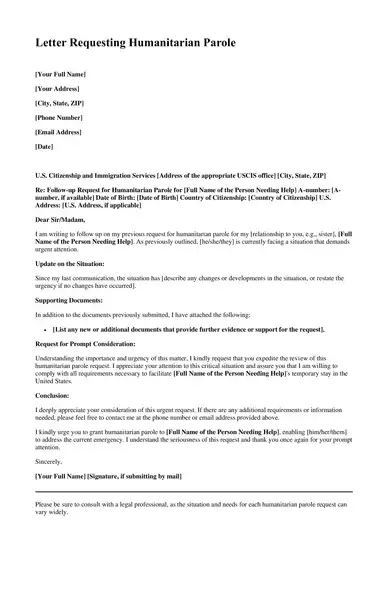
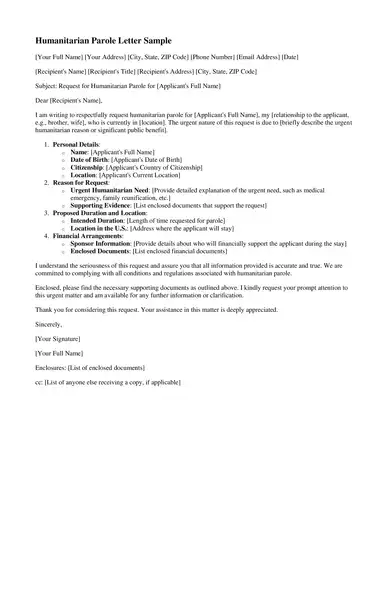
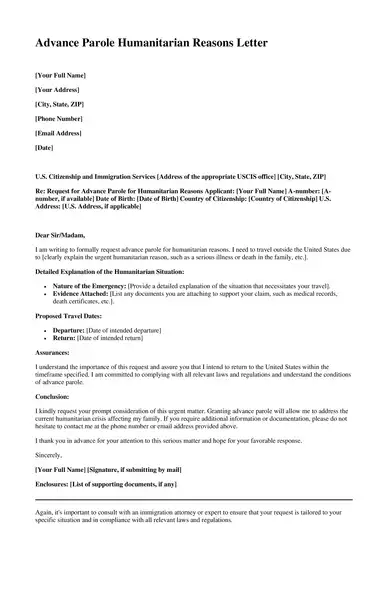
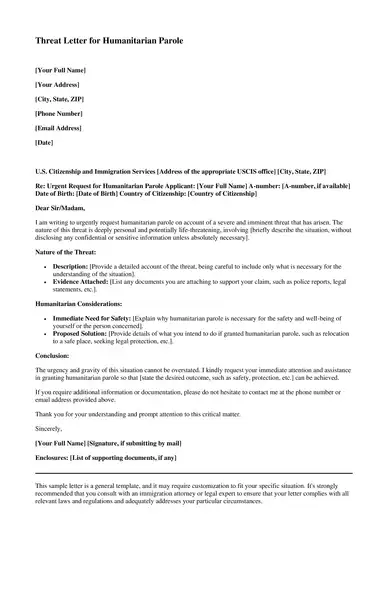
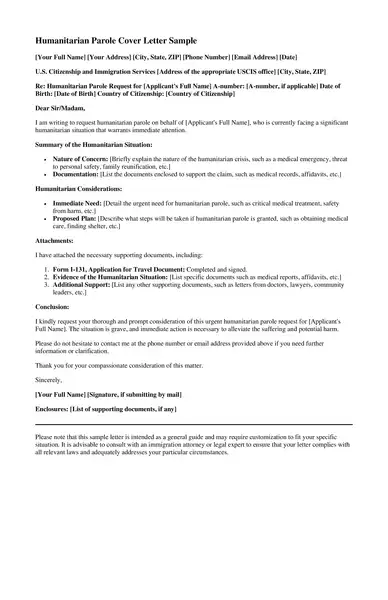
Conclusion
Writing a humanitarian parole letter requires clarity and empathy. Make sure to include all necessary details and follow the given format. This approach will help ensure that your request is understood and considered.
By following the above guidelines, you can create a strong and effective letter that complies with the rules and regulations concerning humanitarian parole. Remember, your words can make a difference in someone’s life, so take the time to write with care and compassion.

The content creator team at calipsotree.com is dedicated to making topics accessible to everyone, with over 9 years of experience in writing and breaking down complex concepts into easy-to-understand articles that answer readers’ financial questions.






